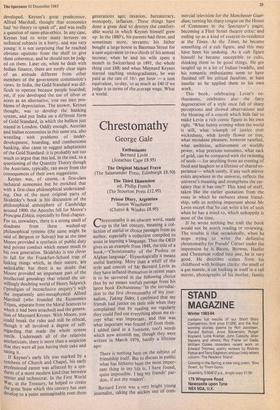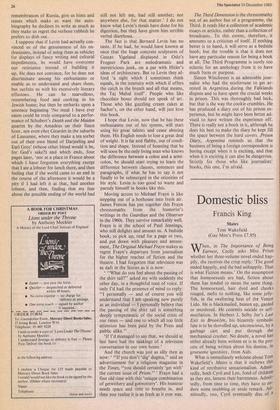Chrestomathy
George Gale
Enthusiasms
Bernard Levin (Jonathan Cape 0.95)
The Original Michael Frayn
(The Salamander Press, Edinburgh £8.50)
The Third Dimension
ed. Philip French (The Stourton Press £12.95)
Prison Diary, Argentina
Simon Winchester (Chatto & Windus £.8.95) rihrestomathy is an obscure word, made
up in the last century, meaning a col- lection of useful or choice passages from an author, especially a collection compiled to assist in learning a language. Thus the OED gives us an example from 1848, the title of a book, `Chrestomathy of the Pushtu or Afghan language'. Etymologically it means useful learning. More than a whiff of the style and conceit of Mr Bernard Levin as they have inflated themselves in recent years is to be savoured in the following choice (but by no means useful) passage from his latest book Enthusiasms; 'In the introduc- tion to the first chrestomathy of my jour- nalism, Taking Sides, I confessed that my friends had justice on their side when they complained that by reading me regularly they could find out everything about me ex- cept what was important, and that was what important was fenced off from them. I added (and in a footnote, too!) words which now astonish me, though they were written in March 1979, hardly a lifetime ago:
There is nothing here on the subject of friendship itself. But to discuss in public what has hitherto been the most impor- tant thing in my life is, I have found, quite impossible. I beg my friends' par- don, if not my readers'.
Bernard Levin was a very bright young journalist, taking the mickey out of com- mercial television for the Manchester Guar- dian; turning his sharp tongue on the House of Commons in the Spectator's pages; becoming a Fleet Street theatre critic; and ending up as a kind of essayist-in-residence at the Times. At the Times, he became something of a cult figure, and this may have been his undoing. As a cult figure himself he became susceptible to cults, thinking them to be good things. He got tangled up in a lot of Indian twaddle, and his romantic enthusiasms seem to have finished off his critical faculties, at least insofar as he applied them to his own work.
This book, celebrating Levin's en- thusiasms, celebrates also the fatty degeneration of a style once full of sharp perceptions and shrewd observations and the bloating of a conceit which bids fair to make Levin a rich comic figure in his own right. 'What balmy evening when the world is still, what triumph of justice over wickedness, what lovely flower or tree, what mundane pleasure, however rarefied, what ambition, achievement or worldly power, what precious memento, what sack of gold, can be compared with the twinning of souls — for anything from an evening of food and laughter to a lifetime of shared ex- perience — which surely, if any such mirror exists anywhere in the universe, reflects the universe's meaning and strengthens the cer- tainty that it has one?' This kind of stuff, taken like the earlier quotation from the essay in which he enthuses about friend- ship, tells us nothing important about Mr Levin except that he can write a lot of tosh when he has a mind to, which unhappily is most of the time.
If he wrote nothing but tosh the book would not be worth reading or reviewing. The trouble is that occasionally, when he stops trying to write the definitive chrestomathy for Pseuds' Corner under the impression he is Bacon, Browne, Hazlitt and Chesterton rolled into one, he is very good. He describes scenes from his childhood with brilliant clarity: the smell of a gas mantle, a cat looking at itself in a tall mirror, photographs of his mother, family remembrances of Russia, give us hints and teases which make us want the auto- biography he declines to write as much as they make us regret the verbose rubbish he prefers to dish out.
I suppose that if Levin had actually con- vinced us of the genuineness of his en- thusiasms, instead of using them as vehicles for displays of fancy writing and cultural impedimenta, he would have overcome our resistance instead of building it up. He does not convince, for he does not discriminate among his enthusiasms or enable us to understand and share them, but surfeits us with his excessively literary effusions. He can be marvellous, remembering food and cooking in his Jewish home; but then he embarks upon a sentence beginning `No meal I have ever eaten could be truly compared to a perfor- mance of Schubert's Death and the Maiden quartet by the Amadeus on their finest hour, not even chez Girardet in the suburbs of Lausanne, where they make a tea sorbet out of their own blend of Darjeeling and Earl Grey' (whose other blend would it be, for God's sake?) and which ends, four pages later, 'nor at a place in France about which 1 have forgotten everything except that I ate a lobster for lunch there, and then feeling that if the world came to an end in the course of the afternoon it would be a pity if I had left it at that, had another lobster, and then, finding that my fear about the possible ending of the world had still not left me, had still another; nor anywhere else, for that matter.' I do not know what Levin's meals have done for his digestion, but they have given him terrible verbal diarrhoea.
The fact is that Bernard Levin has no taste. If he had, he would have known at once that the huge concrete sculptures of Gustav Vigeland displayed in Oslo's Frogner Park are melodramatic and meretricious junk, on a par with Hitler's
ideas of architecture. But to Levin they af- ford 'a sight which I sometimes think equals? in the intensity with which if offers
the catch in the breath and all that means, the Taj Mahal itself'. People who like chocolate boxes should not speak of art.
Those who like guzzling cream cakes at Sacher's, on the other hand, will just love this book.
I hope that Levin, now that he has these enthusiasms out of his system, will start using his great talents and cease abusing them. His English needs to lose a great deal of weight. It is fat and flabby, out of condi- tion and shape. Instead of boasting that he will soon be the only living man who knows the difference between a colon and a semi- colon, he should start trying to learn the difference between clauses, sentences and paragraphs, if what he has to say is not finally to be submerged in the otiosities of his style. Levin is too good to waste and parody himself in books like this.
Moving across to Michael Frayn is like stepping out of a hothouse into fresh air.
James Fenton has put together this Frayn chrestomathy from the humorist's writings in the Guardian and the Observer in the 1960s. They survive remarkably well.
Frayn is in the school of Paul Jennings, who still delights and amuses us. A bedside book, to pick up, read for a page or two, and put down with pleasure and amuse- ment, The Original Michael Frayrt makes us regret Frayn's departure from journalism for the higher reaches of fiction and the theatre. I had forgotten that television was as daft in the Sixties as it is now:
"What do you feel about the passing of the shirt tail?" asked my wife suddenly the other day, in a thoughtful tone of voice. If only I'd had the presence of mind to reply: "I personally — and of course you will understand that I am speaking now purely as an individual — I personally believe that the passing of the shirt tail is something deeply symptomatic of the social crisis of our times — and one to which all too little attention has been paid by the Press and public alike."
'If I'd managed to say that, we should at last have had the makings of a television conversation in our own home.'
And the church was just as silly then as now: "If you don't 'dig' dogma," said an advertisement for a religious magazine in the Times, "you should certainly 'get with' the current issue of Prism." ' Frayn had a fine old time with this 'unique combination of getwithery and gotwottery'. His humour needs space and time to breathe in, and then you realise it is as fresh as it ever was. The Third Dimension is the chrestomathy not of an author but of a programme, the Third. It reads like a collection of academic essays or articles, rather than a collection of broadcasts. To this extent, therefore, it amounts to a criticism of itself. If nothing better is to hand, it will serve as a bedside book; but the trouble is that it does not have any particular reason for being a book at all. The Third Programme is surely too eclectic for an anthology from it to have much form or purpose.
Simon Winchester is an admirable jour- nalist who had the misfortune to get ar- rested in Argentina during the Falklands dispute and to have spent the crucial weeks in prison. This was thoroughly bad luck, but that is the way the cookie crumbles. He has produced a diary out of his prison ex- perience, but he might have been better ad- vised to have written the experience off. There is really not a book in it, although he does his best to, make the diary he kept fill the space between the hard covers. ,Prison Diary, Argentina reminds us that the business of being a foreign correspondent is boring except when it is exciting, and that when it is exciting it can also be dangerous. Strictly for those who like journalists' books, this one, I'm afraid.















































 Previous page
Previous page